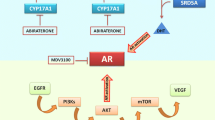Abstract
Relationship of prostate cancer with the polymorphism of p53 codon 72 was reported with inconsistent results. The purpose of this study was to quantitatively evaluate the association between p53 codon 72 polymorphism and prostate cancer susceptibility. We performed an extensive search of relevant studies and made a meta-analysis, including 8 studies with 815 prostate cancer cases and 1047 controls. The combined results showed that there were no significant differences in genotype distribution between prostate cancer cases and control on the basis of all studies, CC/GC versus GG (OR = 1.24, 95% CI: 0.93–1.65), GG/GC versus CC (OR = 0.96, 95% CI: 0.60–1.55), GC versus GG (OR = 1.27, 95% CI: 0.91–1.77), CC versus GG (OR = 1.25, 95% CI:0.74–2.12), GC versus CC (OR = 1.09, 95% CI: 0.63–1.87). When stratifying for the race, there were also no statistically significant differences in genotype distribution between prostate cancer cases and controls. This meta-analysis did not provide an evidence of confirming association between p53 codon 72 polymorphism and prostate cancer.





Similar content being viewed by others
References
Kamangar F, Dores GM, Anderson WF (2006) Patterns of cancer incidence, mortality, and prevalence across five continents: defining priorities to reduce cancer disparities in different geographic regions of the world. J Clin Oncol 24:2137–2150
Kolonel LN (2001) Fat, meat, and prostate cancer. Epidemiol Rev 23:72–81
Chan JM, Gann PH, Giovannucci EL (2005) Role of diet in prostate cancer development and progression. J Clin Oncol 23:8152–8160
Duffield-Lillico AJ, Dalkin BL, Reid ME, Turnbull BW, Slate EH, Jacobs ET, Marshall JR, Clark LC, Nutritional Prevention of Cancer Study Group (2003) Selenium supplementation, baseline plasma selenium status and incidence of prostate cancer: an analysis of the complete treatment period of the Nutritional Prevention of Cancer Trial. BJU Int 91:608–612
Schwartz GG (2005) Vitamin D and the epidemiology of prostate cancer. Semin Dial 18:276–289
Weinstein SJ, Wright ME, Pietinen P, King I, Tan C, Taylor PR, Virtamo J, Albanes D (2005) Serum alpha-tocopherol and gamma-tocopherol in relation to prostate cancer risk in a prospective study. J Natl Cancer Inst 97:396–399
Roemeling S, Roobol MJ, de Vries SH, Gosselaar C, van der Kwast TH, Schröder FH (2006) Prevalence, treatment modalities and prognosis of familial prostate cancer in a screened population. J Urol 175:1332–1336
Pienta KJ, Esper PS (1993) Risk factors for prostate cancer. Ann Intern Med 118:793–803
Levine AJ (1997) p53, the cellular gatekeeper for growth and division. Cell 88:323–331
Hollstein M, Sidransky D, Vogelstein B, Harris CC (1991) p53 mutations in human cancers. Science 253:49–53
Liu G, Miller DP, Zhou W, Thurston SW, Fan R, Xu LL, Lynch TJ, Wain JC, Su L, Christiani DC (2001) Differential association of the codon 72 p53 and GSTM1 polymorphisms on the histological subtype of non-small cell lung carcinoma. Cancer Res 61:8718–8722
Belyavskaya VA, Vardosanidze VK, Smirnova OY, Karakin EI, Savkin IV, Gervas PA, Cherdyntseva NV, Voevoda MI (2006) Genetic status of p53 in stomach cancer: somatic mutations and polymorphism of codon 72. Bull Exp Biol Med 141:243–246
Buyru N, Tigli H, Dalay N (2003) P53 codon 72 polymorphism in breast cancer. Oncol Rep 10:711–714
Bookstein R (1994) Tumor suppressor genes in prostatic oncogenesis. J Cell Biochem Suppl 19:217–223
Wu WJ, Kakehi Y, Habuchi T, Kinoshita H, Ogawa O, Terachi T, Huang CH, Chiang CP, Yoshida O (1995) Allelic frequency of p53 gene codon 72 polymorphism in urologic cancers. Jpn J Cancer Res 86:730–736
Henner WD, Evans AJ, Hough KM, Harris EL, Lowe BA, Beer TM (2001) Association of codon 72 polymorphism of p53 with lower prostate cancer risk. Prostate 49:263–266
Suzuki K, Matsui H, Ohtake N, Nakata S, Takei T, Nakazato H, Okugi H, Koike H, Ono Y, Ito K, Kurokawa K, Yamanaka H (2003) A p53 codon 72 polymorphism associated with prostate cancer development and progression in Japanese. J Biomed Sci 10:430–435
Wu HC, Chang CH, Chen HY, Tsai FJ, Tsai JJ, Chen WC (2004) p53 gene codon 72 polymorphism but not tumor necrosis factor-alpha gene is associated with prostate cancer. Urol Int 73:41–46
Huang SP, Wu WJ, Chang WS, Wu MT, Chen YY, Chen YJ, Yu CC, Wu TT, Lee YH, Huang JK, Huang CH (2004) p53 codon 72 and p21 codon 31 polymorphisms in prostate cancer. Cancer Epidemiol Biomarkers Prev 13:2217–2224
Leiros GJ, Galliano SR, Sember ME, Kahn T, Schwarz E, Eiguchi K (2005) Detection of human papillomavirus DNA and p53 codon 72 polymorphism in prostate carcinomas of patients from Argentina. BMC Urol 5:15
Quiñones LA, Irarrázabal CE, Rojas CR, Orellana CE, Acevedo C, Huidobro C, Varela NE, Cáceres DD (2006) Joint effect among p53, CYP1A1, GSTM1 polymorphism combinations and smoking on prostate cancer risk: an exploratory genotype-environment interaction study. Asian J Androl 8:349–355
Hirata H, Hinoda Y, Kikuno N, Kawamoto K, Dahiya AV, Suehiro Y, Tanaka Y, Dahiya R (2007) CXCL12 G801A polymorphism is a risk factor for sporadic prostate cancer susceptibility. Clin Cancer Res 13:5056–5062
Acknowledgment
This work was supported by the grants from the Cademic Leader Foundation and Doctor’s Scientific Research Foundation of Anhui Medical University.
Conflict of interest
No conflict of interest had been declared by the authors.
Author information
Authors and Affiliations
Corresponding author
Rights and permissions
About this article
Cite this article
Zhu, Y., Wang, J., He, Q. et al. Association of p53 codon 72 polymorphism with prostate cancer: a meta-analysis. Mol Biol Rep 38, 1603–1607 (2011). https://doi.org/10.1007/s11033-010-0269-x
Received:
Accepted:
Published:
Issue Date:
DOI: https://doi.org/10.1007/s11033-010-0269-x




